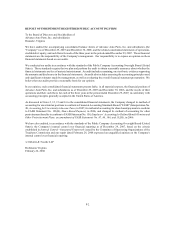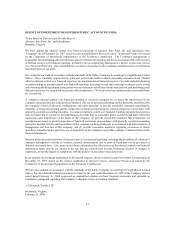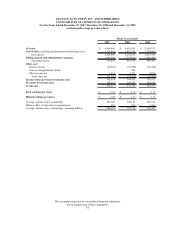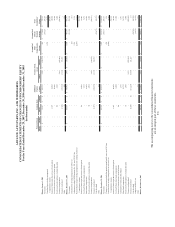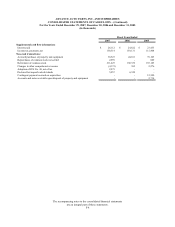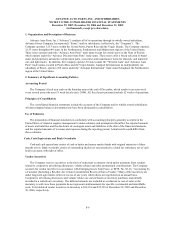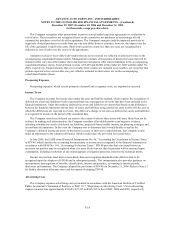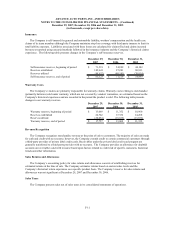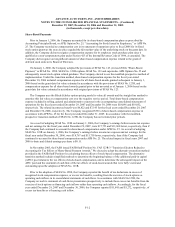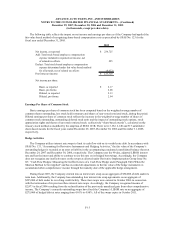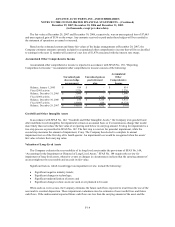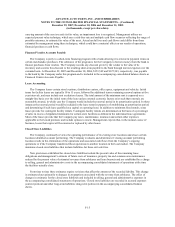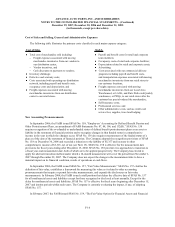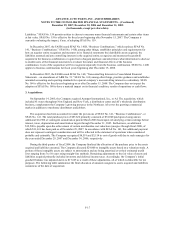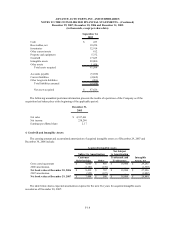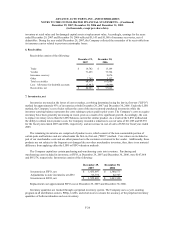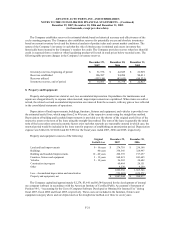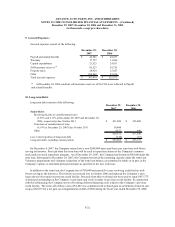Advance Auto Parts 2007 Annual Report Download - page 71
Download and view the complete annual report
Please find page 71 of the 2007 Advance Auto Parts annual report below. You can navigate through the pages in the report by either clicking on the pages listed below, or by using the keyword search tool below to find specific information within the annual report.ADVANCE AUTO PARTS, INC. AND SUBSIDIARIES
NOTES TO THE CONSOLIDATED FINANCIAL STATEMENTS – (Continued)
December 29, 2007, December 30, 2006 and December 31, 2005
(in thousands, except per share data)
Share-Based Payments
Prior to January 1, 2006, the Company accounted for its share-based compensation plans as prescribed by
Accounting Principles Board, or APB, Opinion No. 25, “Accounting for Stock Issued to Employees,” or APB No.
25. The Company recorded no compensation cost in its statement of operations prior to fiscal 2006 for its fixed
stock option grants as the exercise price equaled the fair market value of the underlying stock on the grant date. In
addition, the Company did not recognize compensation expense for its employee stock purchase plan since it
qualified as a non-compensatory plan under Section 423 of the Internal Revenue Code of 1986, as amended. The
Company did recognize an insignificant amount of share-based compensation expense related to the grant of
deferred stock units to its Board of Directors.
On January 1, 2006, the Company adopted the provisions of SFAS No. 123 (revised 2004), "Share-Based
Payment," or SFAS No. 123R. SFAS No. 123R replaces SFAS No. 123 and supersedes APB Opinion No. 25 and
subsequently issued stock option related guidance. The Company elected to use the modified-prospective method of
implementation. Under this transition method, share-based compensation expense for the fiscal year ended
December 30, 2006 included compensation expense for all share-based awards granted subsequent to January 1,
2006 based on the grant-date fair value estimated in accordance with the provisions of SFAS No. 123R, and
compensation expense for all share-based awards granted prior to but unvested as of January 1, 2006 based on the
grant-date fair value estimated in accordance with original provisions of SFAS No. 123.
The Company uses the Black-Scholes option-pricing model to value all awards and the straight-line method to
amortize this fair value as compensation cost over the requisite service period. Total share-based compensation
expense included in selling, general and administrative expenses in the accompanying consolidated statements of
operations for the fiscal years ended December 29, 2007 and December 30, 2006 were $18,096 and $19,052,
respectively. The related income tax benefit was $6,822 and $7,145 for the fiscal years ended December 29, 2007
and December 30, 2006, respectively. The Company recognized $363 of share-based compensation expense in
accordance with APB No. 25 for the fiscal year ended December 31, 2005. In accordance with the modified-
prospective transition method of SFAS No. 123R, the Company has not restated prior periods.
As a result of adopting SFAS No. 123R on January 1, 2006, the Company’s earnings before income tax expense
and net earnings for the fiscal year ended December 29, 2007, were $17,753 and $11,060 lower, respectively, than if
the Company had continued to account for share-based compensation under APB No. 25. As a result of adopting
SFAS No. 123R on January 1, 2006, the Company’s earnings before income tax expense and net earnings for the
fiscal year ended December 30, 2006, were $18,767 and $11,730 lower, respectively, than if the Company had
continued to account for share-based compensation under APB No. 25. The related impact in fiscal years 2007 and
2006 to basic and diluted earnings per share is $0.11.
In November 2005, the FASB issued FASB Staff Position No. FAS 123R-3 “Transition Election Related to
Accounting for Tax Effects of Share-Based Payment Awards.” We elected to adopt the alternative transition method
provided in the FASB Staff Position for calculating the tax effects of stock-based compensation. The alternative
transition method includes simplified methods to determine the beginning balance of the additional paid-in capital
(APIC) pool related to the tax effects of stock-based compensation, and to determine the subsequent impact on the
APIC pool and the statement of cash flow of the tax effects of stock-based awards that were fully vested and
outstanding upon the adoption of SFAS No. 123R.
Prior to the adoption of SFAS No.123R, the Company reported the benefit of tax deductions in excess of
recognized stock compensation expense, or excess tax benefits, resulting from the exercise of stock options as
operating cash inflows in its consolidated statements of cash flows. In accordance with SFAS No.123R, the
Company revised its statement of cash flows presentation prospectively to include these excess tax benefits from the
exercise of stock options as financing cash inflows rather than operating cash inflows. Accordingly, for the fiscal
year ended December 29, 2007 and December 30, 2006, the Company reported $11,841 and $5,272, respectively, of
excess tax benefits as a financing cash inflow.
F-12


